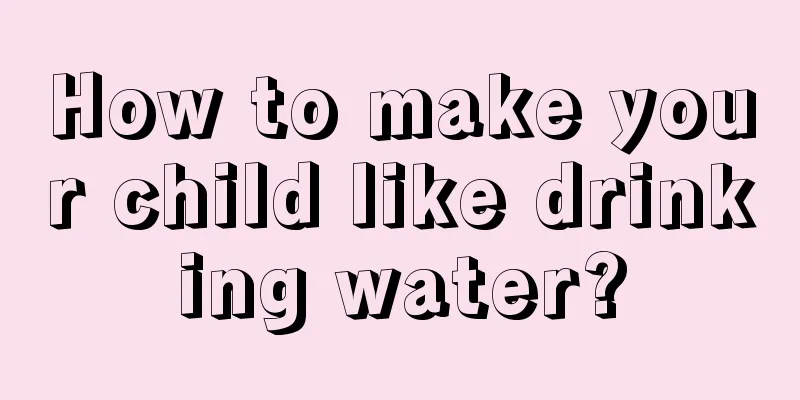How to make your child like drinking water?

|
Children don't like to drink water, which is a headache for many parents. Parents chase their children with a bottle of water, but their children just won't drink no matter how they coax them. This makes parents anxious. Why don't children like to drink water? How to solve the problem of children not drinking water? How to make children love drinking water? Let the editor teach you a few tips. What to do if your child doesn't like to drink water1. Parents should have the same stance If you think something is right, you must stand firm. All parents must communicate well, and never let the "loophole" of "you can't get it from mom, but you can get it from dad" happen. Both parents must be very clear: beverages cannot replace boiled water. Beverages often contain more sugar and electrolytes, and taste good, but they cannot leave the stomach as quickly as boiled water after drinking. If beverages stay in the stomach for a long time, they will cause adverse stimulation, affect digestion and appetite, and increase the burden on the kidneys. 2. Teaching by example is more important than teaching by words If you ask your child to drink more water while you are drinking Coke, it is not convincing and the child will feel unfair. The child grows up watching his parents. If he sees his parents pouring a glass of water when they are thirsty, he will naturally learn to drink water; if he sees his parents often looking for drinks in the refrigerator, he may drink secretly even if he dares not to do so in front of them. If you don't want your child to hold a bottle of drink all day, then the first thing parents should do is not to buy it or store drinks at home. Even if you occasionally let your child satisfy his craving, he should drink it on the spot. 3. Don’t show weakness in a confrontation When children insist on drinking beverages, parents should not compromise because they are worried about their children's insufficient water intake. The word "fear" can easily make parents passive. Unless the child is dehydrated (such as not moving, dry skin, chapped lips, etc.), parents do not need to be too anxious. 4. Turn passivity into initiative Try to get your child to drink water, but make it natural, not forced. For example, prepare a bottle of water at the place where the child is active, observe how much he drinks, and remind him if he drinks too little, but don't force him; when the child is thirsty or hungry and asks you for something to eat during non-meal time, ask him to drink water first. 5. Tips to induce drinking more water You can add lemon slices and apple slices to boiling water to make the water look beautiful and have a light fruity flavor, which will increase the fun of children drinking water. How to tell if you are drinking enough water1. Urine volume: Under normal circumstances, babies urinate more than 6-8 times a day. 2. Urine concentration: The baby's normal urine is clear and transparent. If the urine volume is insufficient or the color is too yellow, you need to encourage your child to drink more water. 3. Dry skin and constipation do not mean dehydration: Although dehydration can cause constipation, constipation is not necessarily caused by dehydration. It may be due to insufficient fiber intake, excessive intake of starch or gelatin-rich foods, or rice paste or milk powder that are too concentrated, leading to excessive intake of trace elements such as calcium and iron. When does the baby need water?1. When the baby vomits, remember to give the baby water after the vomit is dealt with and the baby stops vomiting. This is because the baby may take away a lot of water during the vomiting process. 2. When the baby has a fever, the fever will cause the loss of water in the body. At this time, the baby also needs to be replenished with water. 3. When the baby has diarrhea, he is also losing water. At this time, because the baby excretes thin food, he will naturally take away a lot of water. 4. After the baby plays in the sun or moves for a long time, although he does not sweat, the water in the body will be lost due to the sun. Therefore, at this time, parents must also replenish water for the baby regularly and quantitatively. Don't replenish too much at a time, but drink a small amount multiple times, so that the baby will not lack water and will not urinate frequently. The harm of dehydration in babiesA study found that children who were naturally dehydrated tended to have reduced auditory digit span, semantic flexibility, and image recognition abilities, indicating that dehydration can also reduce children's cognitive abilities. Therefore, once the baby is dehydrated, it will endanger the baby's health, so parents should pay attention to the symptoms of dehydration: the baby cries but has no tears; the lips are dry and cracked; the urine is yellow with a fishy smell; the baby does not urinate for a long time; the baby is drowsy and sleepy, and the mental state is extremely poor after waking up, and the baby is very irritable. |
<<: What is Neck Drowning and How to Prevent It
>>: Can I lose weight by breastfeeding? Can I lose weight by breastfeeding?
Recommend
The three major pain points of natural childbirth. Is natural childbirth really painful?
Many people have probably only seen the pain of c...
What characters should be avoided when naming a baby girl? How to name a baby girl based on her birth date?
There are many ways to name a baby. Every family ...
Child safety seat ranking: Which brand of child safety seat is good?
Child safety seats are a must-have for families w...
How many times a day is normal for a newborn baby to have bowel movements after breastfeeding?
How many times a day is normal for a newborn baby...
Does obesity before pregnancy affect the fetus?
If you want to give birth to a healthy and smart ...
What does internal inspection check? How is it conducted?
Many mothers who have given birth know that befor...
What are the early symptoms of uterine rupture and how to care for recovery
Uterine rupture is a serious threat to women'...
What is the best temperature to set the air conditioner at during the confinement period in winter? What is the appropriate temperature to set the air conditioner at in winter?
When you are in confinement in winter, mothers sh...
Is it normal for Anerle diapers to have a smell? Does Anerle diapers have fluff pulp?
Anerle diapers are the earliest to be produced an...
What are the symptoms of spotting in late pregnancy? How long will it take to give birth after spotting?
The safety of the mother and fetus in the third t...
Can I keep a cat while pregnant? What should I pay attention to when keeping a cat while pregnant?
Many people keep cats before they get pregnant, b...
How to eat crabs? What is the best way to eat crabs?
The crab season is here. How to cook the big, ten...
The water temperature for bathing your baby in winter. What is the best way to keep warm when bathing your baby in winter?
In winter, the indoor temperature is relatively l...
What are the symptoms of formaldehyde poisoning? How to treat formaldehyde poisoning?
Today is a really eventful day. We have just seen...
The efficacy and function of Lengshenling toothpaste. Is Lengshenling toothpaste effective for tooth sensitivity?
I have always heard that Lengshenling toothpaste ...









